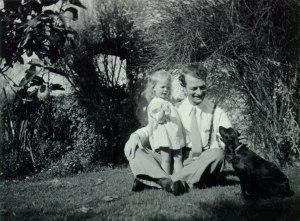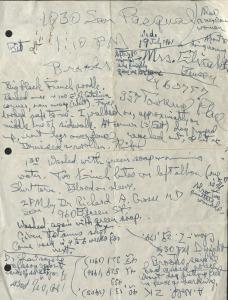
Linda Pauling and her father enjoying a calmer moment with a dog in 1934.
[In honor of the dog days of summer, we present here a fictional “L.A. noir” retelling of real events documented by Linus Pauling on July 19, 1961.]
The sun beat down on Pasadena in the middle of the Summer in California, and the pavement was so hot you could cook an egg, if you liked your egg full of broken glass and cigarette butts instead of salt and pepper.
Linus Pauling didn’t, so he had gone out to lunch instead. It was just after 1 o’clock in the afternoon on an entirely typical Wednesday, and the professor was headed back to the campus of the California Institute of Technology, where he was teaching chemistry. He did it mostly for the chemistry, which was why he had met a girl he eventually married as an instructor back in Oregon, but the teaching was the part that paid (at least, in legal American tender).
California agreed with Pauling, though he didn’t always agree with it. The back yard of a house on San Pasqual Street he was walking past was quite the example. The professor shook his head in despair. Some people just don’t know how to take care of the world we live in. The place was overgrown, the grass was dead, and there was a trash bag next to the road and… Wait a minute, Pauling scratched his head in wonderment. Is that dog off its leash?
A large black French Poodle ran up to a wire fence and barked at him. Strange, Pauling considered. I’m not whistling or doing anything to provoke this animal in any way… why would this dog be so agitated? But, with his mind still buzzing over questions of atomic valences he had been puzzling over back at the lab, he quickly put the thought away as the dog ran off farther down the fence line behind some hedges.
Pauling had only gone another five or six strides down the sidewalk when suddenly, in a flash of white blinding pain, his arm was seized. Good God! Has it been lying in wait for me? The sleeve of his shirt tore and was speckled with blood, and he howled in agony as the dog’s gleaming teeth sank back behind the fence while the thunderous barking continued. Pauling, clutching ineffectually at his mangled appendage, staggered from the scene of the crime in a blur. Wounded though he was, his keen scientific mind analyzed the situation with precision and clarity. The sidewalk was only five feet wide. The animal approximately four feet long. For it to place its hind legs on the fence and lean over half its body out over the edge to attack me in such a way, it must have learned this behavior over many repeated attempts…
The dog had almost certainly seen him coming, barked at him, and noting his direction, had retreated to farther down the sidewalk where it could hide behind a hedge row and launch a surprise attack. The professor’s mind has honed by the adrenaline now coursing through his veins, and he took stock of the situation.
Two gashes on the left arm, each between one-half and five-eighths of an inch long, two puncture wounds made by the dog’s teeth, and one torn shirt which Mama will most likely be thankful not to press again. She’s always complained about the color ‘mustard’ on a man… said its the sort of thing that should only be on a shirt if you’re a sloppy eater. He almost smiled in spite of himself.
At least I wasn’t wearing my favorite coat…
But even Pauling’s trademark optimism quickly disintegrated as the dark nature of the event dawned on him: After all, there were no witnesses.
This was no accident. The dog had purposely prepared to attack him, lurking in the shadows, just biding its time, waiting to jump him. Obviously the whole thing was a set up. Pauling felt dizzied with his failure to see it coming. But who was behind it all? Though there were no witnesses to the savaging he had received, Pauling brazenly approached the house in question and found two women within. It was high time he got some answers.

At first, the ladies were tight-lipped, maybe even scared to confess too much for fear of what might happen to them, but eventually Pauling convinced them to talk. They revealed that the owner of the dog lived at the house and went by the name of Dwight Brooks. Even better, he would be home in about an hour. Pauling decided to wait.
When Brooks drug himself back into the house, reeking of smoke and the sweat of a day’s work, he hardly batted an eye at the interloper. Pauling broached him on the issue of the attack, hedging his accusatory tone and hoping to talk sense into the man. Maybe this was all just some sort of misunderstanding?
No dice. Brooks was unrepentant. Sure, Brooks’ dog liked to jump up and bark at people. But what was it to Pauling? If the professor had been bitten, he must have strayed too close to the fence. Brooks said he had talked to the police before, and he wasn’t worried about one passerby’s misfortune at getting too close to his property. It was his God-given right to house this creature, so long as it was on his property. The Law was on Brooks’ side, he assured, since there was no problem with his dog barking; unless, of course, the dog was in violation of Pasadena’s noise control ordinance.
Back at the Caltech Health Center, Pauling’s mind swam with worst case scenarios. Could it be true that the police had rubber stamped this suburban menace? And if so, what would this mean for others who happened down the same street? Would they suffer the same fate as he had?
“Easy, Dick…” Pauling tried not to squirm as his friend and colleague Doc Richard Crosse, who was washing the wound with antiseptic, jabbed a needle into his tender arm to make sure the professor didn’t get tetanus.
“You’re lucky,” the doctor told him. “If you were a little bit shorter, this would have been a lot worse.”
Then it hit him: The dog had only been able to bite his elbow, but this was only—he did some quick mental calculations—exactly three feet and nine inches off the ground. The fence, he remembered with Sherlockian precision, was precisely 38 inches high. Calculating the difference between these factors and the average height of a child, Pauling arrived at the fact of the matter: if this animal struck again, it might easily a young child with its gaping maw. Such an outcome could not be allowed.
“A bite on the face of a child such as I received on my arm might cause serious permanent damage to a child,” Pauling growled. He made a curt cutting motion with his hand, and the Doctor finished with the bandages.
“Hey!” Crosse called after him as he dashed from the room, “Just because we’re friends and all doesn’t mean you can skip out on the bill!”
But there was no time. Pauling would worry about the details later. Now on a crusade for the good of defenseless citizens walking along this sidewalk and children everywhere, the professor started pumping the Caltech faculty for information. This couldn’t have been the first time something like this had happened. What, he wondered, was the pattern? Finally, someone cracked: two associates revealed that attempted attacks by the same dog in the same yard had come so close to maiming them that they had started avoiding that sidewalk altogether, walking on the opposite side of the street to avoid the beast. They hadn’t mentioned it before now; they had just gone on living in fear, bowing to the will of the Black Dog of San Pasqual Street.
Everything was becoming clearer. It sounds like Brooks has this beast carving out an Empire on San Pasqual, Pauling thought. Why, he already might as well own the entire sidewalk from Wilson to Catalina! What will this man take if no one stands up to him and says that enough is enough?
That night when he got home, Pauling found the bill for $11.50 from Dr. Crosse waiting for him at his front door. He grumbled and dropped it on his desk, putting it from his mind. Ava Helen made his favorite dinner, but nothing could take his mind off of the dog. He wrote feverishly, composing a page of notes trying to make sense of it all, but he just couldn’t figure how to bring the man to justice. Once in bed, Pauling only lay tossing and turning. Frustrated, he went for a cool swim in the pool and then retired to his office, retrieving his trusty Dictaphone and pacing back and forth, thinking out loud and going over the details again and again. He had to consider the most important question of all: Would the beast strike again?
Cool, unfeeling reason told him that without any doubt it would. “I think that there is no doubt that the dog is a vicious dog,” Pauling mused to himself. “He attacked me completely without provocation…”
That’s when Pauling remembered something Brooks had said, about the law being on his side: he had made mention of the police getting involved before, due to his dog’s habit of jumping up on the fence. That’s it! he realized. The fact that Brooks told me about his dog’s habit of jumping and barking at strangers corroborates the fact that this was not an isolated incident. The attempted attacks of the faculty at CIT show that what happened to me might well happen to anyone. I think I can prove that this is a vicious dog who is in the habit not just of barking harmlessly at strangers, but of attempting to purposely bite anyone who walks by!
Pauling realized that if he could just persuade some of his friends down at the station of this, he might be able to halt Brooks’ scheme to keep his side of the street clear of pedestrians in its tracks. He started drafting a letter to the Chief of Police right away.
As Pauling typed away furiously he retold the whole story, explaining in careful detail how it all went down, and he wondered how best to wrap the whole thing up.
Finally he ended the letter simply, saying, “I request that you take proper action about this matter.” He signed it with a shrug.
He would put it in the mail and it would be at the Pasadena Police Department at Arroyo Parkway by the end of the day.
Almost as an afterthought, he picked up the medical bill from Crosse and sealed it in a new envelope addressed to Dwight Brooks.
There’s one case closed, he considered with a smile, then thought, Now back to ending atmospheric nuclear testing and ensuring world peace…
And he curled up next to Ava Helen and finally went to sleep.
Advertisements